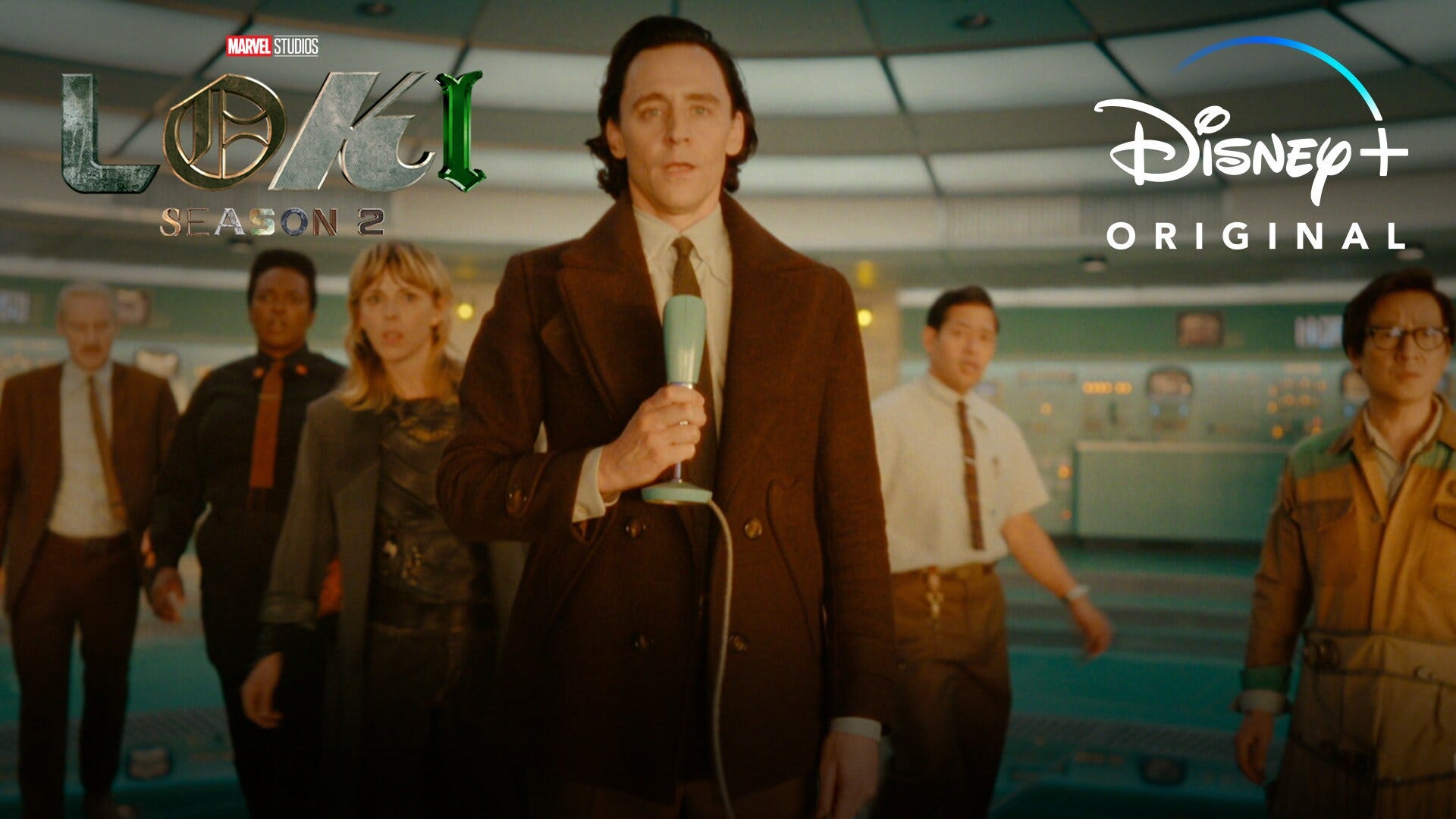Superhero Fatigue?
Or maybe just not compelling narrative decisions.
I don’t believe in “superhero fatigue.” That’s cited all the time as a reason that recent films in the genre are performing below expectations. I don’t believe in it. Just like I don’t believe in “romantic comedy fatigue” or “gangster movie fatigue” or “World War II drama fatigue” or anything else that is rooted in a genre. Because a genre is a very broad category, and inside every genre there are good, bad, horrendous, and great executions of the material. And a great movie is a great movie regardless of genre.
I’m going to talk about Loki season 1 and what we’ve seen so far of season 2. It’s a little unfair, because season 2 is just getting started, and I very well may be signing its praises by the time we get to the end. Also, I am enjoying Loki season 2, but I’m hearing people online saying it’s “confusing” and “not as good” and I’m waiting for “superhero fatigue” to drop as an explanation. Another reason I don’t like this term is it takes the responsibility off the narrative designers and puts it on the audience, as if it’s their fault for not being in the right mood to appreciate the diamonds on display. But I’d say the fault is always at the foot of narrative drive and narrative structure, whether or not the material has a clear, concise theme and plot (they work together) that hooks us in the heart and the head.

And before I start, let’s please remember that writing is hard, writers are exploited, and writers just won a 148 day strike one of the points of contention of which was to get the studios to quit shrinking writers rooms and make the conditions under which they are asked to create more comfortable and sustainable. Marvel also seems to be going through a bit of a moment right now, restructuring the way it creates television, and hopefully it’s moving into a new phase where more attention is paid to the writing and the respect for the craft of writing.
So, with those caveats, and with SPOILERS, let’s look at Loki.
Season 1 has a very sharp structure. Loki is kidnapped by the TVA, and organization responsible for maintaining the timeline, and sent after a villain who threatens to bring it all down. Only the villain is a female version of Loki himself, and she gradually convinces Loki that he’s on the wrong side of the fight. Easy to grasp. Clear goals. A twist. A moral center. Better still, the plot relies on the three central characters understanding each other, letting go of their false assumptions about themselves and others, and coming together for things to reach a resolution. So we know they’ll be some amazing, heartfelt character moments (which there were). I love it.
Now season 2.
Out of the gate, t first problem is it doesn’t deliver on what it promised at the end of season 1. At the end of season 1, we learn that He Who Remains (a version of Kang the Conqueror) built the TVA to prune the timeline of all other realities in which variants of himself tried to take over the multiverse, so that in bringing the TVA down, we may be unleashing a worse horror as a quintillion Kangs plunge all of everything into war. Loki and his female variant Sylvie are at odds, with Sylvie choosing to kill Kang anyway and Loki not so sure that’s the right move. Then she punts him back to the TVA, where he discovers the timeline has already been rewritten, his friend Mobius doesn’t remember him, and reality seems to have been rewritten so that Kang was always the leader of the TVA. Great, chilling stuff. It promises that in season 2, Loki is going to have to a) fight to survive all over again b) convince his best friend Mobius that they are friends and c) take on the new TVA.
Only SPOILER none of that happens. In a bait and switch, that “alternate timeline” was just the past, a past that was erased from Mobius’ memory (and every other TVA employee’s), so none of that promised drama need occur. And to me, this feels a bit like the hard shift in direction in The Matrix Reloaded. At the end of The Matrix, Neo calls the machines, warns them he's about to show everyone in the Matrix a world without limits or control, and extends a hand to the machines to help him build a new reality. But Reloaded shifts the focus. We never again see anyone in the illusion of the Matrix woken up. Instead, the Matrix is just a playground for rebels and agents to fight in, and the stakes are about saving the (rather boring) city of Zion. In the same way, even Loki’s time shifting problem—jumping between past and present TVA—is solved pretty quickly, and the focus is on saving the TVA from some sort of [technobabble technobabble] meltdown that threatens all reality. But it’s also about finding Sylvie for “reasons” and also a conflict inside the TVA over its mission - prune timelines vs preserve timelines. So the new character O.B. (short for Ouroboros, played by the wonderful Ke Huy Quan) is fixing the TVA, while Loki and Mobius are hunting Sylvie, and Hunter B-15 is maybe trying to stop the rogue (official?) elements of the TVA from pruning all the new timeline branches and save “billions of lives” that just popped into existence a few minutes ago.
It’s kind of a mess. Or rather, it’s like a cat’s cradle of string that the plot and theme needs to be teased out of. And again, I am enjoying it, and now that the gangs all here, the narrative may start to pick up and straighten out. But I think there’s a learning opportunity here, so let’s go over some early problems:
- We don’t have a clear narrative structure.
- We don’t have a deep emotional connection to the stakes.
- We don’t have clarity on the various sides’ goals.
- [Technobabble[ has to [Technobabble] or else OMG [TECHNOBABBLE]!
- Our main character tortures someone for information in the second episode. (This isn’t a big structural problem, but it *really* sat wrong with me.)
Now, leaving aside with the fact that I wouldn’t have gone with a bait and switch (and I know people bagged on The Matrix Resurrections, but at least it went back to and fulfilled the promise of the first film), engaging with the narrative we have in front of us, this is how I’d fix it.
- Loki is still bouncing through time. Maybe not as frequently but he will die if this isn’t stopped. This gives the main character some urgent stakes as well as a way to gain further insight into the origins of the TVA, which is important because…
- There is a CIVIL WAR inside the TVA. There is, already, but it isn’t named as such. The show is hiding its stakes, making them muddled and fuzzy, when coming out and saying “the TVA is having a civil war over its purpose - those who believe they should now be protectors of all multiversal life and those who want to prune back to one timeline.” That’s strong stuff. And it’s already there, but it’s being buried under so much muchness all around it, and it may have already been resolved in episode 2, and it shouldn’t be because…
- Loki should still be conflicted as to which side he is on. After all, if all those new timelines are pruned, then NO KANG THE CONQUEROR can arise from them, and that’s what he wants, right? It’s what he was considering at the end of last season. Why isn’t he still considering it? He should be. So that now…
- Sylvie has to convince Loki that he’s on the wrong side. And Loki bouncing through time (and learning new things about how insidious the TVA and Kang is/was) can contribute to that. And by the way, that torture scene, where Loki bullies a character called Brad that I don’t really remember from season 1, would have been so much more compelling if it was Loki in that box! Just think if memory-wiped Mobius was torturing Loki, and Loki was having to connect with Mobius before he was squashed—how compelling that would be! Also, we already had Tom Hiddleston in a a tuxedo running through alleys in 70s London. Everyone knows James Bond is supposed to be the one being pumped for intel in the death trap, not the one operating the laser beam! But I digress, because I’m talking specifics when what we need to do is clarify the BIG STAKES, and we do that by revealing that…
- He Who Remains left a failsafe that will blow up all the timelines if it isn’t shut down. Right now, we’re told that the TVA computers “can’t process” all the new timelines and so everything is going to go boom or poof or something. But… but… the multiverse existed BEFORE the TVA. Why does it need a TVA at all to continue existing? Wouldn’t destroying the TVA ensure the multiverse could flower and branch and grow forever? Now you’re telling me that it’s dependent on the very thing designed to constrain it? Is Kang like a dealer or a pharmaceutical company that hooks you on a drug and then sells it to you for life? No, no, no, this is muddled. This is technobabble nonsense. Kang has seeded bombs that will destroy EVERYTHING. And we have to STOP IT. That’s clean. That’s clear. That shows us that we can’t trust evil ever.
Now we’ve got a strong narrative. Loki is going to die. The multiverse is going to explode. The TVA, who would normally be the ones to save it, are plunged in civil war. And Loki isn’t sure which side he should be truly support. And Sylvie reaches Loki this time, the same way he reached her last time, and we throw in on the side of LIFE, and the TVA is reworked (at the end) into an organization that protects all timelines, not prunes them down to one. And our story is about choice and freewill and self determination vs control and authority (which right now our main characters are sort of embodying and that’s never good.) And Ke Huy Quan still gets to be his awesome self.
So there you have it. As I say, we may still be heading there. But so far, the show is not hammering on those themes as strongly as it could, and it doesn’t seem to communicating the stakes and the character arcs as strongly as it should. In fact, it may be doing a lot of what I suggest it needs to do, but if we can’t tell, it doesn’t matter. So I don’t believe it’s “superhero fatigue.” I believe it’s that they needed more time to dig down and tease out these themes. Clarify, clearly state, tie to character, streamline, go!
So it’s not “superhero fatigue,” it’s strong narratives vs weak narratives, and making sure you communicate those themes clearly and loudly, and that your characters have personal stakes, character growth, and universal stakes neatly set out in a triangle of interrelated connections.
And that’s why Kevin Feige should at least take me to lunch.
But seriously, I hope you enjoyed this. I know it’s been a while since I’ve been here. I’ve had my head down with several exciting projects. I’ll be back soon to talk about them, as well as have more thoughts on other stories. Until then…
Thanks for reading!

